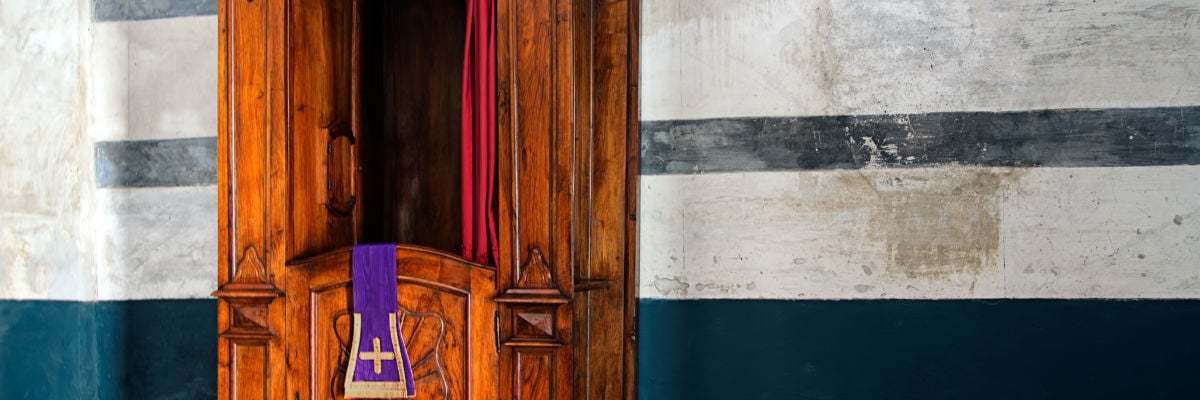
A shocking new law in Washington challenges one of the Church’s most sacred principles: the seal of confession. Can the state force priests to break it? On this episode of Catholic Answers Live, Cy Kellett is joined by Colin Donovan and Brenda Aikin to unpack the legal, theological, and pastoral fallout. What has the Church taught for centuries—and what happens next?
Transcript:
Brenda: The Washington governor on Friday signed a bill into law that requires by law that priests break the seal of confession to report incidents of child abuse. Now, the archbishop right away posted a comment on that and just real directly said, any priest who does that will be immediately excommunicated. So my question is, how can the state come in and do this when I believe that the seal of confession is already set law in the United States?
Colin: Well, not just in the United States, for almost 1,000 years now, since the time of the Fourth Lateran Council, I don’t know who, I forget who the Pope was, this question came up. And so it was at that time decided that no, the seal of confession, you could not break that. The priest could not break that. Now, that was also a period of turmoil when governments were trying to have the role of installing bishops and the popes were fighting against that. There was the whole investiture controversy around these years as well. So almost 1,000 years ago in Western civilization, this has been a settled question.
Now, at no time could a priest ever have revealed it. But as a matter of law in the West, this has been settled in England and on the continent and elsewhere. And of course, we inherited that common law and that relationship of church and state, which had its ups and downs, obviously, as the Reformation came along. So obviously this is new ground for the state of Washington.
And sadly, the state of Washington, I lived there in the late 70s and 80s in Seattle. And there has been a progressive, you know, throwing over of Western values in terms of, you know, things from whether it’s abortion, the life of the unborn, whether it’s the right of the parents to determine whether their minor child could have an abortion. I was in Seattle when that law was passed and parents, schools were taking kids to the abortion clinics against the will of their parents.
And we’ve marched down the road now to where this spiritual role has been, is being interfered with. And they really can’t do it. And it’s not in the interest of the state. They think it’s for the good of the state. But what is going to keep a person that abuses children, primarily is what they’re talking about, but it could be other kinds of abuse as well? What will keep them? I think conversion, for which the seal of confession is absolutely necessary, or prison. So they better build more prisons in Washington State, because that’s about the only way to stop abusers is to put them in prison.
The confessional is there to help them overcome their vice. But if they can’t go to confession in the state of Washington, they’re not seeking that path. Now, I don’t believe, and I think one of the bishops, it might have been Spokane, one of the bishops in Washington said, well, priests simply won’t do it. And I believe absolutely they won’t. And it will come to court. And I would hope that our Supreme Court of the United States would say that that violates the First Amendment. It so patently does that I don’t see how any court, much less why a Catholic governor would sign that bill, but yet he did.
So we’ll see what comes of this. But priests are going to protect the seal. So penitents go to confession believing that your sins will not be spoken of outside of that confessional to anybody but you. And even then priests generally don’t do that outside the confessional and keep going to confession. And it’ll come to a head either by the civil, quote, in quote, civil disobedience of protecting the seal or because one of the courts steps in and says this is blatantly unconstitutional as it is most definitely.
Cy: Is it popular up there, the bill?
Colin: Well, they have been working on this from as far as I can tell for about three years. And this is the year that they’ve been able to get that passed. It’s been held for a vote or two. It’s incredible.
Cy: It’s silly. They have to know there’s no Catholic priest that’s going to do it. Silly.
Colin: Yeah. When I posed the question to our auxiliary bishop, Frank Schuster, he said that, he said, we will go to jail. We will go to jail.
Cy: But you know, I wonder what you think about this, Colin. Maybe, you know, but I have heard in various jurisdictions around the world where there are such laws, the bishops simply instruct their priests they can no longer hear face-to-face confession and so they don’t know who is confessing to them.
Colin: Well, that, I mean, that might be a solution and that would be in the sense that the priest could always say, I don’t know who it is. You know, one of the things that anybody who keeps a professional secret can say to anybody who asks, who doesn’t have the right to know, is to say, I don’t know that. I can’t answer that. Because it’s implied in that that there is some reserved reason why he can’t say it. The lawyer who can’t speak to something his client has told, the doctor who can’t speak to something his patient has told, the priest who can’t speak to something and says I don’t know anything about that doesn’t mean he doesn’t know anything in the absolute sense.
But anybody with two brain cells to rub together would know that he’s not permitted to speak about that. Priest, lawyer, doctor, or whatever.
Yeah, but unfortunately, common sense is getting, you know, rarer and rarer.



